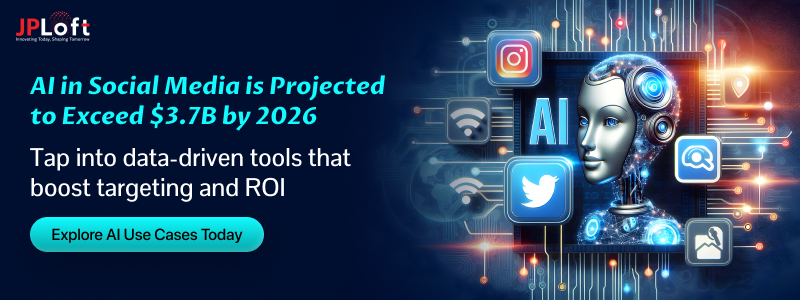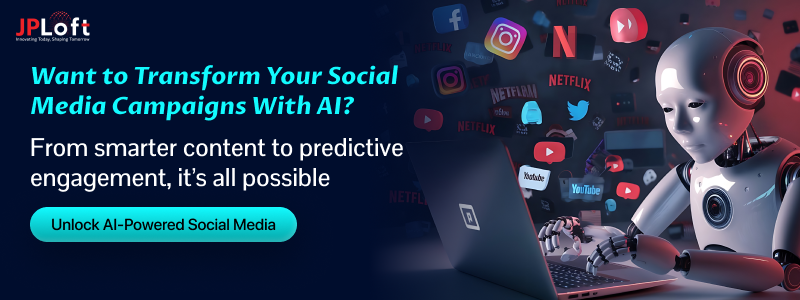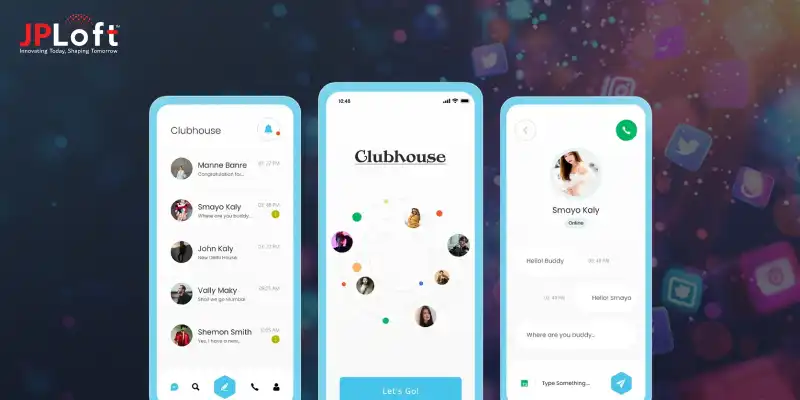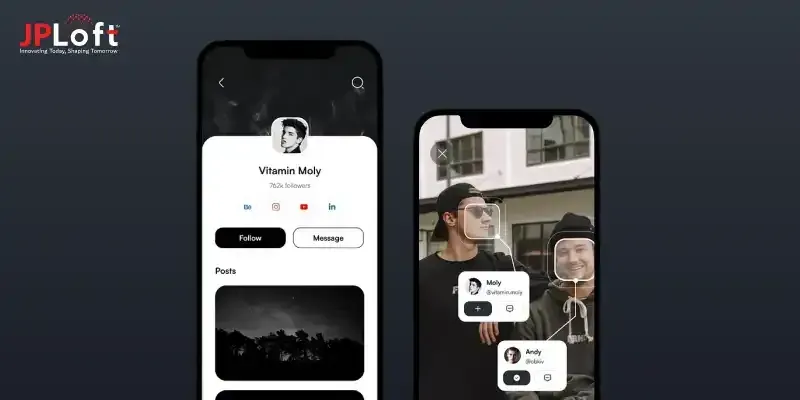Key Takeaways
AI is transforming social media by delivering personalized experiences, predictive insights, and automated content moderation.
Understanding how to use AI in social media apps helps businesses boost engagement, improve retention, and drive growth.
Key applications include chatbots, sentiment analysis, visual recognition, trend forecasting, and AI-powered recommendations.
While implementing AI, challenges like high costs, data privacy, and scalability must be carefully managed.
Best practices such as clear AI objectives, user-centric design, data quality, and continuous optimization ensure successful adoption.
Partnering with JPLoft enables businesses to seamlessly implement AI features and build smarter, safer, and more innovative social media platforms.
Artificial Intelligence (AI) is revolutionizing how people connect, create, and communicate online. From hyper-personalized feeds to intelligent moderation, AI in social media is turning data into deeply engaging, real-time experiences.
Today, every swipe, scroll, and share is guided by algorithms that understand user intent better than ever before. Social media giants like Instagram, TikTok, and LinkedIn are leveraging AI to recommend content, enhance ad targeting, and foster safer digital spaces.
In this blog, we’ll explore the top use cases of AI in social media, its real-world impact on user engagement and brand growth, and how businesses, developers, and marketers can use these innovations to build smarter, data-driven social platforms in 2025 and beyond.
All About Social Media: Growth, Market Trends, and AI Influence
Studying the best social media apps gives a clear picture of how platforms evolve to meet changing user behaviors and expectations.
Social media has become one of the most powerful industries worldwide, connecting over 5 billion users in 2025 and continuing to grow at an impressive pace.
Platforms like Facebook, Instagram, and TikTok dominate daily digital interactions, while niche platforms are also emerging to cater to specific communities.
Businesses are increasingly relying on social platforms for marketing, branding, and customer engagement.
The global market size for social networking is projected to surpass $310.37 billion by 2030, fueled by advanced technologies such as AI, AR, and automation.
The growing demand for AI applications in social media platforms highlights how personalization, content moderation, and audience targeting are evolving rapidly.
“Artificial intelligence is not just enhancing how people interact on social media, it’s reshaping the entire ecosystem by powering smarter content delivery, safer online environments, and deeper user engagement.”- Deloitte 2025 Global Tech Trends Report.
Key Data Insights on Social Media Growth:
-
5.04 billion active users worldwide in 2025, representing more than 60% of the global population.
-
TikTok crossed 1.8 billion monthly active users in 2024, making it one of the fastest-growing platforms.
-
Instagram Reels generate 20% more engagement compared to regular posts, strengthening short-form content dominance.
-
Advertising revenue from social media is expected to reach $250 billion by 2028, led by video and AI-powered ad targeting.
-
AI-driven personalization improves user retention by up to 35%, proving its vital role in social media success.
-
Nearly 50% of marketers now use AI tools to automate content creation, boost ad performance, and enhance audience engagement across social media platforms.
-
AI is increasingly generating ad creatives for brands, with adtech firms reporting a fast-growing share of marketing assets now produced using AI tools.
Before launching their own AI-powered solution, businesses should also evaluate the social media app development cost, as budgeting plays a key role in long-term sustainability.
Why Do You Need a Social Media App in 2025?
In today’s hyper-connected world, social media apps are no longer optional; they’re essential for individuals, businesses, and communities.
Here are the key reasons why you need a social media app:
1. Massive User Engagement
With billions of users spending hours daily on social platforms, creating a social media app allows you to tap into this ever-growing audience.
People use apps not only for communication but also for shopping, networking, and entertainment.
2. Business Growth and Branding
Companies build social media apps to strengthen customer relationships, improve brand visibility, and drive conversions.
Features like in-app marketing and influencer collaborations help businesses expand globally.
Understanding the role of AI in social media apps also ensures businesses stand out with smarter personalization.
Tools like the Renderforest AI video generator empower brands to transform scripts, blog posts, or marketing copy into visually compelling video content helping them boost engagement, strengthen brand storytelling, and scale content production effortlessly.
3. Revenue Opportunities
Social media platforms generate significant income through ads, subscriptions, and premium features.
Before starting, entrepreneurs should evaluate how social media apps make money and plan their monetization strategies accordingly.
4. Customization and Innovation with AI
The use of artificial intelligence in social media apps allows for personalized feeds, smart recommendations, and predictive analytics.
These AI-driven enhancements improve user retention while opening new revenue channels.
5. Competitive Advantage
Top platforms are constantly innovating. To stay ahead, businesses must research the cost to develop an app like Instagram and focus on building differentiated features that drive engagement, scalability, and long-term relevance in the fast-paced digital ecosystem.
6. Security and Trust
Modern users expect privacy protection. Entrepreneurs must invest in social media app security to prevent data breaches and build trust with their audience.
Ignoring this can lead to failure, as seen with platforms that collapsed due to poor safety measures.
Benefits of Using AI in Social Media Apps
Artificial Intelligence is revolutionizing how social media platforms operate. From smarter analytics to enhanced user experiences, AI gives businesses and creators the edge they need in an increasingly competitive digital space.
Here’s how AI adds value to social media apps in 2025 and beyond:
► Personalized Content and Recommendations
AI helps social media apps understand users’ preferences by analyzing engagement patterns.
This enables personalized feeds that keep users hooked longer. Platforms that apply the impact of AI in social media apps witness higher retention rates and user satisfaction.
► Smarter Customer Engagement
AI-driven chatbots and virtual assistants automate responses, manage queries, and improve customer support.
For startups learning how to start a social media business, this feature reduces operational costs while maintaining 24/7 engagement with users.
► Enhanced Content Moderation
With millions of posts daily, detecting spam, hate speech, and misinformation manually is nearly impossible.
The use of AI in social media apps ensures real-time monitoring and faster content moderation using NLP and ML algorithms.
► Improved Marketing Campaigns
AI tools analyze data to identify audience segments and predict campaign performance.
Businesses can use these insights to improve their social media app features, ensuring better targeting and engagement with minimal ad spend.
► Boosted Creativity and Trend Forecasting
AI assists creators by suggesting hashtags, trending topics, and optimal posting times.
Influencers and marketers use AI-powered analytics to predict emerging trends, helping them stay relevant in a constantly shifting ecosystem.
► Streamlined Development and Testing
Developers can integrate AI-driven testing tools that automatically detect UX flaws, performance issues, and scalability problems.
These advancements align perfectly with resources like the social media app testing guide, ensuring smoother app performance across devices.
► Broader Communication Experiences
Integrating AI also enhances voice and visual communication. For instance, incorporating features similar to Snapchat alternatives can help platforms stand out with creative filters, AR effects, and voice-driven tools powered by AI.
Applications of AI in Social Media
Artificial Intelligence is the driving force behind how social media platforms analyze data, engage users, and personalize experiences.
From predictive analytics to advanced content generation, the AI applications in social media platforms are redefining what’s possible.
Here’s a breakdown of the most impactful applications shaping the industry today:
1] Personalized Feed Algorithms
AI studies user behavior to determine what content appears in feeds. It uses metrics like engagement, interests, and browsing history to keep users scrolling.
The implications of AI in social media apps ensure each user’s experience feels unique and relevant.
2] Automated Content Creation
AI tools generate captions, hashtags, short videos, and even full posts. Creators and marketers can rely on automation to save time and maintain consistency.
Platforms focusing on innovation can take cues from social media app development trends to integrate such intelligent creation tools.
3] Predictive Analytics for Marketing
AI analyzes patterns to predict user behavior, ad performance, and campaign outcomes. Businesses use these insights to refine marketing strategies and design features that keep users engaged.
Emerging brands researching how to design a social media app can leverage AI-driven data visualization and analytics dashboards.
4] Visual Recognition and Tagging
AI enables image and video recognition that detects faces, products, or locations, helping auto-tag users and brands. This boosts engagement and simplifies content discovery.
Apps like Instagram and Pinterest are known for using this technology extensively, influencing the cost to build an app like BeReal or other media-centric platforms.
5] AI-Powered Chatbots and Support
From replying to comments to managing customer service, chatbots streamline communication and enhance user satisfaction.
This makes automation a must-have for any business evaluating Discord alternatives or planning AI integration for their next app.
6] Content Moderation and Sentiment Analysis
AI detects inappropriate content and monitors user sentiment to maintain healthy online communities.
Developers working on social media app maintenance can leverage AI to track engagement metrics, identify anomalies, and automatically flag problematic trends before they escalate.
7] Voice and Video Enhancements
AI enhances user-generated content by improving video clarity, adding filters, and optimizing sound quality.
This technology plays a vital role in modern communication and creativity across platforms.
How to Integrate AI in Social Media?
Integrating AI into social media apps isn’t just a trend; it’s a strategic necessity. When done right, AI can enhance user experiences, automate processes, and provide powerful insights that drive growth.
Here’s a structured overview of how to use AI in social media apps effectively:
Step 1: Define Your AI Objectives
Before integration, identify what you want AI to achieve: better personalization, smarter recommendations, automated moderation, or real-time analytics.
Clear goals streamline the implementation of artificial intelligence in social media apps and ensure each feature delivers measurable value.
Step 2: Collect and Organize Data
AI thrives on data. Gather user behavior data, engagement patterns, and content metrics ethically and securely.
Businesses focusing on privacy-first design can explore Skype alternatives that balance innovation with robust security models.
Step 3: Choose the Right AI Tools and Frameworks
Selecting suitable AI libraries and frameworks (like TensorFlow, PyTorch, or Dialogflow) ensures scalability and efficient development.
For entrepreneurs learning how to develop an app like Reddit, integrating AI from the start simplifies future upgrades and feature expansion.
Step 4: Integrate Predictive and Recommendation Models
Recommendation systems powered by machine learning enhance personalization. Whether suggesting friends, posts, or ads, predictive models ensure users stay engaged longer.
Developers can build an AI app with adaptive learning models for continuous improvement.
Step 5: Leverage AI for Content Moderation and Safety
AI tools automatically detect spam, hate speech, and fake news, helping maintain community standards.
This makes social apps safer, trustworthy, and scalable for larger audiences.
Step 6: Test and Optimize Using AI-Driven Tools
AI can optimize itself through machine learning feedback loops. Teams evaluating their mobile app tech stack should include AI-based testing and analytics tools for real-time performance tracking.
Step 7: Estimate Your AI Integration Budget
Understanding the cost to implement AI in social media apps is crucial before development.
The budget varies depending on complexity, AI models used, and third-party APIs. Proper planning helps developers avoid overspending while ensuring scalability.
Analyzing the Current and Future Trends of AI in Social Media
AI continues to redefine social media, and understanding its trends is crucial for developers, businesses, and users alike.
From automation to predictive analytics, the use of AI in social media apps is shaping the present and future of digital interactions.
A] AI-Driven Personalization
Social media platforms increasingly rely on AI to tailor content to individual preferences.
The role of AI in social media apps improves engagement, retention, and overall user satisfaction.
Personalized feeds, story recommendations, and targeted ads are just the beginning.
B] Voice and Visual Search
With AI-powered voice commands and visual search, users can navigate platforms more efficiently.
Companies partnering with an AI app development company can integrate these advanced features to enhance user experience, boost engagement, and maintain a competitive edge in the social media landscape.
C] Enhanced Advertising and Marketing Analytics
Predictive analytics and AI-driven insights allow businesses to optimize campaigns, reduce ad spend, and improve ROI.
Platforms that prioritize robust development and analytics integration are better equipped to implement tools that anticipate trends and drive smarter marketing decisions.
D] AI in Moderation and Sentiment Analysis
Future social platforms will increasingly rely on AI to detect harmful content, fake news, and negative sentiment in real-time.
Understanding AI applications in social media platforms helps developers implement robust moderation tools.
E] AR/VR and Immersive Experiences
AI combined with AR and VR is creating more immersive social experiences.
These technologies allow brands to offer interactive content and gamified experiences, which is a growing trend for apps in 2025 and beyond.
F] Predictive Trend Forecasting
AI can analyze global engagement patterns and predict upcoming viral content.
Businesses evaluating how to develop a messaging app can leverage these insights to stay relevant and proactive in content creation.
G] Automation and Efficiency in Operations
From scheduling posts to auto-generating captions, AI automates repetitive tasks.
Platforms that embrace this implementation of artificial intelligence in social media apps save time and resources while improving operational efficiency.
Use Cases of AI in Social Media
AI is revolutionizing how social media platforms operate, offering smarter engagement, enhanced user experience, and operational efficiency.
Here are the most impactful use cases of AI in social media apps, demonstrating how businesses and developers can leverage AI effectively:
1. Personalized Content Recommendations
AI analyzes user behavior, past interactions, and preferences to deliver highly personalized feeds.
This keeps users engaged longer and improves platform retention. The use of AI in social media apps ensures content feels relevant and timely for each individual.
2. Predictive Analytics for Engagement
Predictive models help platforms anticipate user actions, content trends, and engagement metrics.
Businesses can make data-driven decisions to optimize features and campaigns, highlighting the impact of AI in social media apps on growth strategies.
3. Automated Content Moderation
AI automatically scans posts, images, and videos to detect spam, offensive content, or fake news.
This safeguards communities, reduces manual effort, and improves trust in the platform, illustrating the implications of AI in social media apps.
4. Smart Chatbots and Customer Support
AI-powered chatbots provide instant responses, personalized recommendations, and 24/7 support.
Developers aiming to learn how to develop a messenger app like Botim can integrate these bots to enhance engagement and satisfaction.
5. Voice Recognition and Commands
Voice-enabled AI allows users to interact with apps hands-free, search for content, or perform tasks.
This functionality showcases the role of AI in social media apps in improving accessibility and user convenience.
6. Sentiment Analysis
AI evaluates user sentiment in comments, posts, or reactions, helping brands understand audience perception.
Companies can respond proactively to feedback, enhancing trust and strengthening brand relationships.
7. Fraud Detection and Security
AI monitors unusual account activity, login patterns, and content anomalies.
These measures strengthen platform security, reduce fraud, and ensure a safer digital environment for users.
8. Automated Video and Image Tagging
AI detects objects, faces, and landmarks to auto-tag content. This boosts discoverability and enhances personalization.
Platforms implementing this feature demonstrate the use of artificial intelligence in social media apps effectively.
9. AI-Powered Analytics Dashboards
Platforms use AI to create real-time dashboards tracking user engagement, trends, and campaign success.
This actionable intelligence allows brands to optimize strategies, proving the role of AI in social media apps for decision-making.
10. Trend Forecasting and Viral Prediction
Machine learning predicts which topics or content might go viral, helping marketers stay ahead.
Businesses exploring how to develop an app like Threads can use predictive models to craft trend-driven strategies.
11. Visual Search Features
AI enables users to search using images instead of keywords.
This increases engagement and creates innovative user experiences, highlighting the use cases of AI in social media apps for enhanced discovery.
12. Automated Ad Targeting
AI determines the best audience segments for ads based on behavior, location, and preferences.
This increases ROI and campaign effectiveness while reducing wasted ad spend.
13. Enhanced AR/VR Experiences
AI powers augmented and virtual reality filters, lenses, and interactive effects.
Developers collaborating with an on-demand app development company can integrate these features to deliver immersive social experiences.
14. User Retention Optimization
AI analyzes user drop-off patterns to identify churn risks. Platforms can proactively engage users with targeted notifications, content, or offers, demonstrating the impact of AI in social media apps on retention.
15. Automated Caption and Hashtag Generation
AI tools suggest trending hashtags, captions, and post formats. This helps creators save time, maintain consistency, and increase discoverability, showcasing the implementation of artificial intelligence in social media apps.
16. AI-Powered Content Translation
AI translates posts, comments, and captions in real-time. This breaks language barriers and helps platforms reach a global audience efficiently.
17. Competitor and Market Analysis
AI tracks competitor activity, audience trends, and content performance.
Businesses can leverage these insights to remain competitive and adjust growth strategies, emphasizing how AI is used in social media platforms effectively.
18. Cross-Platform Integration and Automation
AI helps synchronize content, campaigns, and analytics across multiple social networks. Entrepreneurs wondering how to create an app like Twitter can integrate AI to streamline operations and user engagement across platforms.
19. Content Scheduling and Optimization
AI identifies optimal posting times and frequency based on engagement patterns.
This reduces manual effort and ensures maximum visibility for every post.
20. Smart Notifications and Alerts
AI delivers personalized notifications to keep users informed about important updates, trending content, or interactions, improving user engagement and app retention.
Challenges of Integrating AI in Social Media Apps
While AI offers tremendous benefits, integrating it into social media apps comes with unique challenges.
Understanding these hurdles is essential for developers and businesses aiming for successful implementation.
1] High Implementation Costs
AI integration requires advanced algorithms, cloud computing, and continuous model training.
Calculating the cost to develop an app like MeWe can help businesses anticipate budget requirements.
The cost to implement AI in social media apps can vary depending on complexity and scale.
2] Data Privacy and Security Concerns
AI relies on large amounts of user data, raising privacy risks. Ensuring compliance with GDPR, CCPA, and other regulations is critical.
Platforms that fail to protect user information may face legal issues and trust erosion, emphasizing social media app development challenges.
3] Complexity in AI Model Training
Developing and fine-tuning AI models for content moderation, recommendations, or sentiment analysis can be technically challenging.
Ensuring high accuracy while avoiding biases requires expert knowledge and ongoing adjustments.
4] Integration with Existing Systems
Integrating AI into an existing social media app may require significant backend restructuring.
Legacy systems may not support AI-driven functionalities effectively, making it crucial to plan for the implementation of artificial intelligence in social media apps from the early development stage.
5] User Trust and Adoption
Users may be wary of AI decisions, such as automated content moderation or personalized feeds.
Transparent communication about how AI works helps improve adoption and trust among users.
6] Scalability Issues
As user numbers grow, AI systems must handle increasing data loads efficiently.
Platforms must consider infrastructure, cloud support, and continuous optimization to maintain performance.
7] Cross-Platform Functionality Challenges
Ensuring AI features work seamlessly across devices and operating systems can be difficult.
For developers aiming to learn how to create an app like WhatsApp, it’s crucial to test AI functionalities thoroughly for consistency and reliability.
Practices to Improve the Applications of AI in Social Media Apps
AI can transform social media apps, but implementing it effectively requires strategic planning and best practices.
Here’s how to enhance the use of AI in social media apps while avoiding common pitfalls:
► Start with Clear Objectives
Define the AI functionalities you want: personalized feeds, chatbots, predictive analytics, or content moderation.
A well-planned strategy reduces wasted resources and helps create an app that aligns with user needs and business goals.
► Focus on User-Centric Design
Integrating AI shouldn’t compromise UX. Prioritize intuitive interfaces, easy navigation, and seamless interactions.
Developers must design an app that blends AI capabilities with smooth user experiences for maximum engagement.
► Ensure Continuous Data Quality
AI relies on accurate, up-to-date data. Regularly auditing and cleaning datasets ensures recommendations, predictions, and insights remain reliable.
Poor data management is one of the main reasons why social media apps fail.
► Monitor AI Performance and Feedback
Implement feedback loops to assess AI outcomes continuously. Adjust algorithms based on performance metrics, engagement, and user sentiment.
Platforms aiming for long-term success should follow how to get your social media app approved on the iOS store guidelines to ensure AI doesn’t affect compliance or approval.
► Integrate Security and Privacy Best Practices
AI should be transparent and respect user privacy. Encrypt sensitive data, follow regulations, and provide clear disclosures about AI usage.
Secure and ethical AI implementation fosters trust and long-term retention.
► Combine Human Oversight with AI
Even advanced AI needs human checks for moderation, recommendations, and content validation.
Balancing AI automation with human oversight ensures quality and prevents errors from escalating.
► Optimize for Scalability
Plan for increased user load and data volume. Scalable AI infrastructure ensures performance remains consistent as the platform grows, maintaining a positive user experience.
Partner with JPLoft and Implement AI in Social Media Apps
Ready to take your social media platform to the next level with AI?
Partnering with JPLoft, a leading social media app development company, ensures seamless integration of AI-driven features like personalized recommendations, chatbots, predictive analytics, and content moderation.
Our experts help you strategize, design, and implement cutting-edge AI solutions that enhance engagement, improve user retention, and drive growth.
Whether you’re building a new platform or upgrading an existing one, JPLoft’s tailored solutions make it easy to harness the power of AI and stay ahead in today’s competitive digital landscape.
Conclusion
The integration of AI in social media apps is no longer optional; it’s essential for creating personalized, engaging, and secure user experiences.
From predictive analytics to automated content moderation, AI transforms how platforms interact with users and deliver value.
Businesses and developers who understand the use of AI in social media apps and their potential applications can stay ahead of the competition, improve user retention, and unlock new growth opportunities.
While challenges exist, adopting best practices and leveraging AI strategically ensures sustainable success.
By embracing AI today, social media apps can deliver smarter, faster, and more meaningful experiences for users worldwide.
FAQs
AI enhances social media apps by personalizing content, automating responses, moderating content, and providing predictive insights. The role of AI in social media apps is crucial for boosting engagement and improving overall user experience.
AI analyzes user behavior, optimizes feeds, detects trends, and moderates content automatically. Platforms leverage AI to deliver personalized experiences, streamline operations, and increase retention, showing how is AI used in social media platforms effectively.
AI provides smarter recommendations, improved customer support, automated content moderation, and actionable analytics. Its use of AI in social media apps ensures better engagement, higher retention, and data-driven decision-making.
The cost to implement AI in social media apps depends on complexity, features, AI models, and third-party tools. Businesses should plan budgets carefully to integrate AI efficiently without overspending.
AI is used for personalized content recommendations, predictive analytics, chatbots, automated moderation, sentiment analysis, fraud detection, visual recognition, trend forecasting, and voice/visual search. These use cases of AI in social media apps improve user experience and operational efficiency.
Challenges include high implementation costs, data privacy concerns, model complexity, scalability issues, and user trust. Effective planning, continuous monitoring, and ethical AI practices help overcome these obstacles.













Share this blog